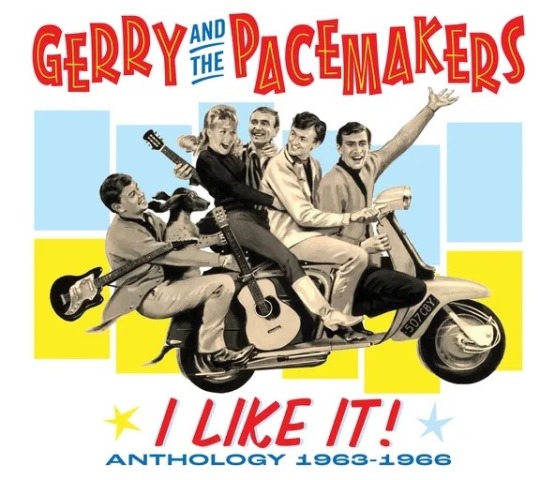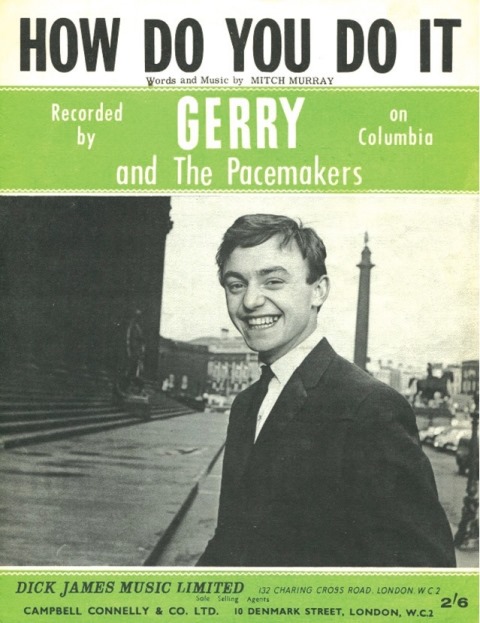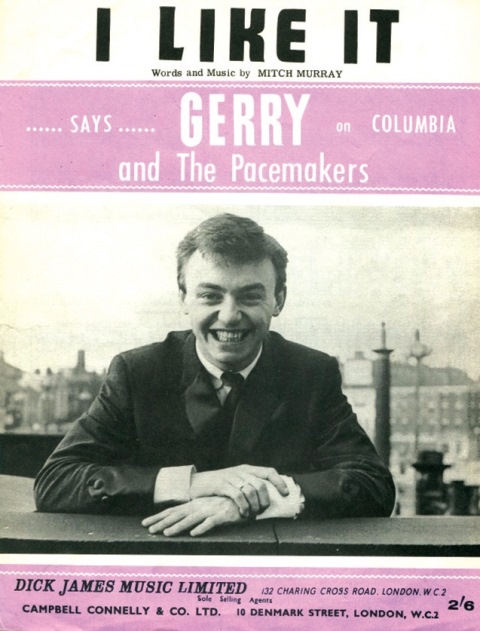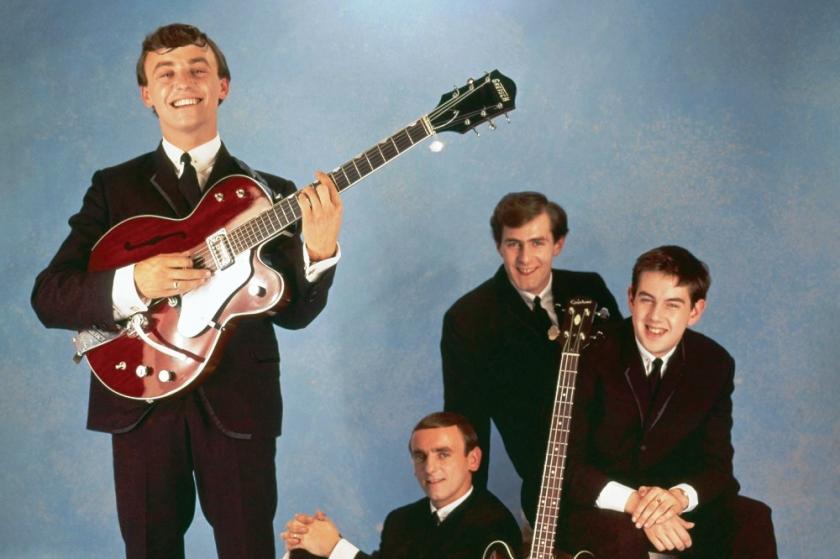The name is so familiar it inhibits analysis. Gerry and the Pacemakers – Gerry Marsden and his band, a group with a designation pronouncing they made the pace, were with the trends. For a while, the case can be made that this is how it was. After The Beatles smashed into the charts, Gerry and the Pacemakers occupied the rung below them as the UK’s second-most commercially successful new band.
Famously, and noted so often it’s a cliché, they were the first British group to score three number ones with their first three singles: "How do You do it?" "I Like it" and "You’ll Never Walk Alone." All this in 1963, the year Merseybeat first strafed the British pop scene. There were also The Merseybeats, The Searchers, Swinging Blue Jeans and more. Next to The Beatles though, Gerry and The Pacemakers were Liverpool’s princes to the Fab’s kings – both groups were managed by Brian Epstein. The cliché is worth repeating.
 In March 1963, NME celebrated their arrival in the Top 30. “Crashing into the NME chart this week comes another beat name from Beatle-land, Liverpool's Gerry and the Pacemakers,” wrote Alan Smith. “Gerry is featured vocalist on 'How do You do it?' which enters the list at No. 17.” Six months later, in September, Record Mirror headlined a piece Gerry And The Pacemakers Too Busy For Recordings! “Mr. Marsden and his merry men have been too darned busy to get to the recording studios in London,” revealed Peter Jones. In February 1964, the Evening Standard’s Maureen Cleave noted “They are second in Brian Epstein's outfit only to the Beatles.”
In March 1963, NME celebrated their arrival in the Top 30. “Crashing into the NME chart this week comes another beat name from Beatle-land, Liverpool's Gerry and the Pacemakers,” wrote Alan Smith. “Gerry is featured vocalist on 'How do You do it?' which enters the list at No. 17.” Six months later, in September, Record Mirror headlined a piece Gerry And The Pacemakers Too Busy For Recordings! “Mr. Marsden and his merry men have been too darned busy to get to the recording studios in London,” revealed Peter Jones. In February 1964, the Evening Standard’s Maureen Cleave noted “They are second in Brian Epstein's outfit only to the Beatles.”
Despite the plaudits, perhaps there was an equivocation from the beginning. That debut single, "How do You do it?" was written by professional songwriter Mitch Murray. The song had already been foisted on The Beatles, who recorded a desultory version which was shelved in favour of one their own compositions. Despite their 300-song live repertoire, Gerry and the Pacemakers were doing what the music business told them to do – rather than immediately carving their own way. "I Like it," the next single, was another Mitch Murray song.
After this, “You’ll Never Walk Alone" was more curious, as it was plucked from the musical Carousel. The Beatles may have had The Music Man’s "Till There Was You" in their act, but going for a Broadway song as an A-side was bold. Whatever the success, if recording their own songs to stress their identity hadn’t happened from the beginning, maybe it’s no wonder Gerry and the Pacemakers were destined to have a limited lifespan.
 Then, there was that name. Pop was red-hot, burning through new styles and trends with an unprecedented turnover rate. The final single credited to Gerry and The Pacemakers was November 1966’s “Girl on a Swing.” It did not chart. A year earlier, the last single to go Top 30 was “Walk Hand in Hand,” released in October 1965. It’s doubtful anyone was parsing their name but three years on from being at the top, Gerry and The Pacemakers were no longer making the pace.
Then, there was that name. Pop was red-hot, burning through new styles and trends with an unprecedented turnover rate. The final single credited to Gerry and The Pacemakers was November 1966’s “Girl on a Swing.” It did not chart. A year earlier, the last single to go Top 30 was “Walk Hand in Hand,” released in October 1965. It’s doubtful anyone was parsing their name but three years on from being at the top, Gerry and The Pacemakers were no longer making the pace.
Nonetheless, they made some terrific records. I Like It! Anthology 1963-1966 is a mammoth 98-track, three-CD, quadruple fold-out digipack set covering their entire spell with EMI’s Columbia imprint. There are doublings-up: stereo and mono versions, versions with and without strings. It’s a lot and, obviously, not all of it can be great. Although their covers of “A Shot of Rhythm and Blues," "Maybelline" or "Slow Down" doubtless worked well in a live context, the studio versions are tepid and thin, even by the standards of the pre-R&B boom period. There is barely any fire, any oomph. The corroboration of their on-stage vitality comes with the tracks recorded live at Oakland’s Auditorium on 25 October 1964: here, “A Shot of Rhythm and Blues" towers over its studio counterpart.
Following the first three singles, Marsden’s own bouncy “I’m the One” was the next A-side. It hit number two. Next, “Don’t Let the Sun Catch You Crying," another of his own songs. Top Ten there. These confirm that beyond the big early hits from outside songwriters which are embedded into the soundtrack of oldies radio, songs written by Marsden also stand out. While "Ferry Cross The Mersey" was an astute musical and thematic echo of "On Broadway," the roughly contemporary top sides “It’s All Right” and “It’s Gonna be All Right” are top-notch pop songs. Marsden was an excellent songwriter, showcased to his best on the album accompanying the group's film Ferry Cross The Mersey, in cinemas in late 1964.
 But the progression towards being a band centred on a quality built-in songwriter faded. As time went on, fewer of Marsden’s songs appeared on record. Also, his songwriting hadn’t developed from the beat or ballad styles of 1963 and 1964. Into the gap came the showtune covers “On a Wonderful Day Like Today,” “The Way You Look Tonight” and “Who Can I Turn to.” As 1965 bled into 1966, chasing what had been big in 1963 with "You’ll Never Walk Alone" wasn’t a sound move for a pop group. Gerry and the Pacemakers were an anachronism. The band announced their split in October 1966, just-before the old-timey “Girl On a Swing,” their final single, went into shops. A US-penned song, it was a hit in Canada and a UK flop. In 1968, Marsden followed Joe Brown into the cast of Charlie Girl In London's West End. Two years on, he was embedded as a UK kids TV regular with his appearances on Sooty and Sweep.
But the progression towards being a band centred on a quality built-in songwriter faded. As time went on, fewer of Marsden’s songs appeared on record. Also, his songwriting hadn’t developed from the beat or ballad styles of 1963 and 1964. Into the gap came the showtune covers “On a Wonderful Day Like Today,” “The Way You Look Tonight” and “Who Can I Turn to.” As 1965 bled into 1966, chasing what had been big in 1963 with "You’ll Never Walk Alone" wasn’t a sound move for a pop group. Gerry and the Pacemakers were an anachronism. The band announced their split in October 1966, just-before the old-timey “Girl On a Swing,” their final single, went into shops. A US-penned song, it was a hit in Canada and a UK flop. In 1968, Marsden followed Joe Brown into the cast of Charlie Girl In London's West End. Two years on, he was embedded as a UK kids TV regular with his appearances on Sooty and Sweep.
Could it have turned out another way? Could the self-penned songs which helped define Gerry and the Pacemakers’ 1964 have given them a different future? Could they have progressed?
I Like It! Anthology 1963-1966 is a huge amount of Gerry and the Pacemakers and, as such, it provides the answers. Based on what they released, this was a band lacking what was necessary to change with the times. This isn’t bad. More that it defines exactly when the pop scene moved on from them. They were left behind. At their best, though, and at the right time Gerry and the Pacemakers lived up to their name.
- Next week: The self-explanatory Isaac Hayes comp Hot Buttered Singles 1968-1972
- More reissue reviews on theartsdesk
- Kieron Tyler’s website















Add comment